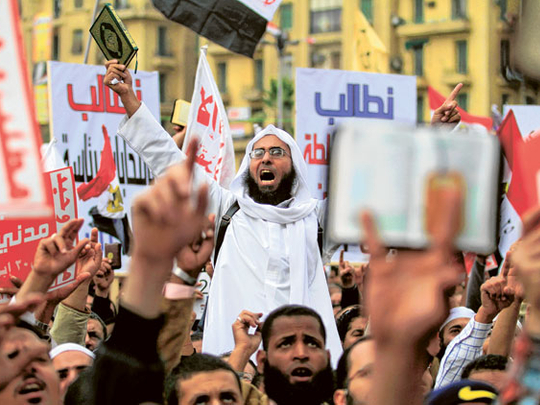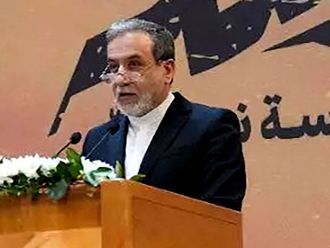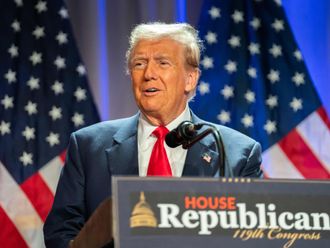
Cairo: Days after Egyptians drove their longtime president from power in February, Mohammad Tolba ordered a latte at an upscale coffee house and waited to see whether his scraggly beard was still radioactive in the new Egypt.
He got a grudging welcome, and that was enough to prod the 32-year-old information technology executive into an effort to bridge a divide that threatens to splinter the Egyptian revolution.
His journey since has tracked the shifting moods of an upheaval that toppled President Hosni Mubarak but remains unfinished. Recently, he found himself in Tahrir Square, with men young and old, secular and religious, lobbing stones in clashes with riot police, a role he had always vowed to avoid. Tolba is a Salafist, an adherent of a conservative view of Islam.
Pariahs under the secular, autocratic, military-backed governments that ruled Egypt for 60 years, Salafists have emerged publicly in recent months in numbers that have startled and frightened liberal Egyptians.
But Tolba believes winning wider acceptance will require building greater trust. "You have a very good product and a terrible salesman," Tolba said of the challenge facing Salafists.
At stake
At stake, he believes, is whether Islamists will manage to reinsert themselves into mainstream Egyptian society without building popular support for a new crackdown by the authorities. As the son of well-off secular parents, Tolba is better suited than most to narrow the gap between liberals and Islamists, groups that have for decades been wary of one another.
When Tolba sat down at a Costa Coffee shop in Cairo that day in late February, stares from fellow patrons in skinny jeans or suits made him feel unwelcome. "The guy serving me coffee and the other guests were feeling uncomfortable, and they were looking at me in a very bad way," Tolba said.
"I started talking to people and making jokes." Some warmed up to him, which planted the seed for what became known as Salafyo Costa, or the Costa Salafis. Tolba and some friends created a Facebook page to encourage Egyptians of all backgrounds to have coffee with Salafists. It soon spun into a thousands-strong lively online forum for debate over politics, foreign policy and religion.
Tolba said he believes a large number of Egyptians will gravitate toward Salafism now that Islamists have greater freedoms, but he insists that such a trend ought to happen organically rather than by force.
"You should not enforce teachings on others," he said at a Costa Coffee one afternoon this summer. "Let the crowds decide what they want. At the end of the day, we will accept what the people say."
As Salafyo Costa gained popularity, Tolba adapted the logo of the British coffee chain, which has three coffee beans, to depict a bearded man.
Soon after Mubarak's ouster, social divisions were exposed. In some cases, violence erupted, most poignantly in a spate of deadly clashes between Salafists and Coptic Christians. "All parties were scared of each other, until they started working toward one goal," Tolba said. "We are trying to bring the spirit of Tahrir Square from the revolution back."
In July, Tolba set up a tent in the square, along with many others who had participated in the revolt. On a sweltering evening, men and women in niqabs talked politics.
Shimaa Mahmoud, 33, a teacher who has been a Salafist for 11 years, said she was looking forward to being governed by a parliament dominated by Islamists. "People suffered a long time under the government," she said. "Now it's time to taste real democracy. Real democracy is in Islam." Rageh Abou Khatwa, 31, another new Salafist, said there is virtually no talk about militancy among people of his generation.
No violence
"Using violence did not achieve anything," he said. "Nobody is calling for this type of violence anymore." Days later, tens of thousands of Islamists from across the country streamed into Tahrir Square for a demonstration to decry what Islamist groups called an attempt by the military and liberal leaders to legally enshrine secular principles before elections are held. Some started waving the black flag associated with violent jihad, commonly used by Al Qaida. "What the hell are you doing?" Tolba demanded. "This is not Afghanistan. Why are you holding these flags?"
One of the men looked confused and replied that he had been asked to wave it, Tolba said. As the sun rose, massive crowds began chanting: "The people want Islamic law!" A vendor sold photographs of slain Al Qaida leader Osama Bin Laden.
Fuming, Tolba left the square. "All of us are feeling so down," he said a few days later.
It wasn't the only time Tolba has felt on the outside looking in. Several traditional Salafists refused to meet with him, thinking his movement was flippant and offensive to the old guard. Although many Christians joined the group, some remain wary of all Salafists, such as the members of a church who agreed to let him speak at a service, only to cancel at the last minute.
Call from within
Mohammad Tolba was not born into a Salafist family. During his late teens and early 20s, he said, he sometimes drank and partied heavily.
He met his wife, Doaa Yehia, 26, in 2000 at a poetry club. He didn't have a beard then. She wore a veil but not a niqab. When a close mutual friend was killed in a car accident, the two experienced a spiritual awakening and gradually became Salafists. Tolba said he was shaken and saddened by the attacks of September 11, 2001. The wars in Iraq and Afghanistan that were launched in response, however, have hardened his views toward the West. Attacks against American soldiers fighting in foreign lands, he said, are justified.
Soon after his first beard grew out, Tolba said, he was stopped at police checkpoints and airports and interrogated about his faith. He was asked which mosques he prayed at and which clerics he looked up to. Feeling ostracised, he took a job in Sudan. "They were treating me like a monster," he said, referring to authorities in Egypt. Also demonised was his favourite Salafist cleric, Mohammad Abdul Maksoud.
"Egyptian people love Islam, and they are calling for Islam," he said.
When recent riots took place Tolba also turned violent and threw stones at the security forces. A day later, when security forces charged into the square, Tolba was among those beaten up. He was left for dead in a pile of corpses. Next to him was a young woman who he thinks died. Before losing consciousness, he said, the woman asked a policeman dragging a corpse: "Aren't you Egyptian, too?"
— Washington Post











